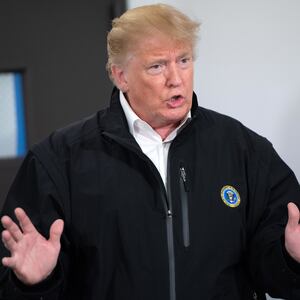Once considered a preposterous idea (“It’s Trump’s party!” “The takeover is complete!!”), it looks like Donald Trump will face a primary challenge.
If you read conservative sites as I do, you’ll know that a loosely formed Greek chorus of conservative Trump critics has been predicting this for some time now.
In September, “Never Trump” conservative Bill Kristol told me a primary challenge was “less hopeless than people think.” More recently, Jonah Goldberg wrote that there is “ample demand” for one.” Erick Erickson said he thinks “there will be a challenge to the President in a primary,” and Jonathan V. Last observed, “If 2020 obeys the normal rules of political physics, President Trump will face a primary challenger.”
What is more, there is polling that suggests that Republican voters in Iowa and New Hampshire are, at the very least, open to a primary against Trump.
But questions remain: Are we about to waste another winter praying in vain for a savior to rise from these streets? And what good would come from such a challenge, anyway?
Those who do not follow center-right media to the extent I do may not be keeping up with Never-Trump LARP fantasy theory for how this might work.
First, and this is key, somebody actually has to get in. “Probably the biggest weakness of the Never Trump challenge is that they just don’t have a horse,” says Jon Ward, author of the book Camelot's End: Kennedy vs. Carter and the Fight that Broke the Democratic Party. “Someone has to jump in.”
The good news is that former Republican governor William Weld’s expected announcement could kick off this process. Weld may be the ice-breaker, but he's a perennial candidate whose fealty to the Republican Party is suspect, having defended Hillary Clinton while running as the Libertarian Party V.P. candidate in 2016. His value will likely be making it easier for others to take the primary plunge.
The key here is to avoid being an easy foil for Trump. That’s exactly why it’s good that Jeff Flake has taken himself out of the running. Credible primary challengers (Reagan in ’76 and Ted Kennedy in ’80, for example) have historically been fiery insurgents taking on a temperamentally moderate establishment figure.
Trump retains his outsider credentials, despite being (by definition) the consummate insider, so the least likely way to defeat him would be to put someone like Flake up against him.
So, what type of candidate should volunteer as tribute? According to Jerry Taylor, head of the Niskanen Center (host to a conclave of Trump critics dubbed the Meeting of the Concerned), a candidate representing “Reaganite conservatism in the Bill Buckley tradition” wouldn’t have a shot against Trump, since—as Taylor notes—Fox News now defines what constitutes “conservative.”
As such, Taylor argues the ideal candidate should run as a more experienced, competent, ethical populist than Trump—someone who could tap into the kinds of arguments Tucker Carlson recently made during his controversial monologue. “It would be very difficult for someone like Ben Sasse to mount an argument like that,” Taylor says, “but I could certainly see [Maryland Governor] Larry Hogan doing it.”
Indeed, Hogan, a cancer survivor who has been elected twice in the blue state of Maryland, but is largely unknown outside his state, would pose a very different challenge from the kind of adversaries (think Marco Rubio and Ted Cruz) that Trump dispatched in 2016. "He's got a lot of blue-collar appeal," agrees Sarah Longwell, a Republican strategist who has been studying reluctant Trump voters within the GOP, regarding Hogan. “You've got to have someone who can eat into Trump's coalition. You're not going to build a winning campaign just on Never Trumpers."
Did I mention that he’s just a placeholder—a Eugene McCarthy—anyway?
Yeah, back to the plan. It goes like this. Hogan starts softening up Trump. And then, step two is this: Something magical happens. Maybe it comes from Robert Mueller, maybe it’s an economic downturn, maybe it’s Trump using emergency powers, or maybe it’s some external event nobody sees coming. But something big happens. Sound crazy? As Jon Ward told me, “We’re talking about the future, not right now. Things can change quickly.”
Maybe even—and this is arguably the best scenario for the anti-Trump forces—a weakened Trump ends up fighting a weird two-front primary war with Hogan on his populist left and Ann Coulter for president on his populist right. Okay, I'm skeptical of this, too. But a political action committee in favor of restrictionist immigration policies has launched a campaign to draft her, and there are some plausible arguments for why she could do it.
Now comes the coup de grace: In an effort to save the party from imploding, Nikki Haley is reluctantly drafted into the race. She rides in on a white horse and instantly becomes consensus choice of what is left of the Republican Party.
This, as far as I can tell, is the premium plan. The fantasy we cling to. But sometimes if you shoot for the moon and—even if you miss—you still hit the stars. Just as Ronald Reagan staked out the future by running (and losing) in 1976, presenting an alternate vision to Trump for young Republicans is a worthwhile endeavor.
This is the story we tell ourselves.
One thing’s for certain, though: You can’t beat somebody with nobody.
It’s your move, Larry Hogan.






